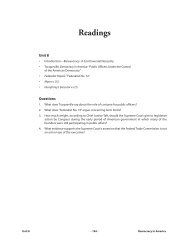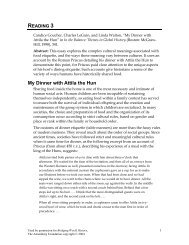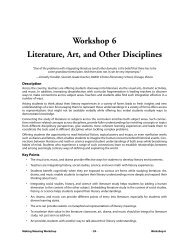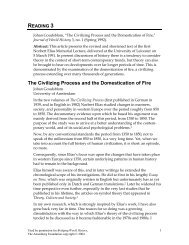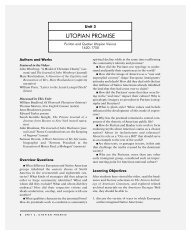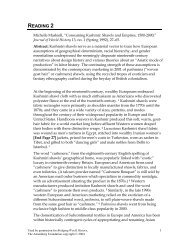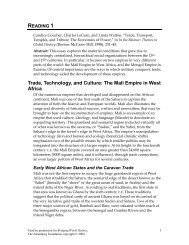Ethics Reader
Ethics Reader
Ethics Reader
Create successful ePaper yourself
Turn your PDF publications into a flip-book with our unique Google optimized e-Paper software.
deduction, but we must allow him, while doing the most unjust acts, to have acquired the<br />
greatest reputation for justice. If he have taken a false step he must be able to recover<br />
himself; he must be one who can speak with effect, if any of his deeds come to light, and<br />
who can force his way where force is required his courage and strength, and command of<br />
money and friends.<br />
And at his side let us place the just man in his nobleness and simplicity, wishing, as<br />
Aeschylus says, to be and not to seem good. There must be no seeming, for if he seem to be<br />
just he will be honoured and rewarded, and then we shall not know whether he is just for the<br />
sake of justice or for the sake of honours and rewards; therefore, let him be clothed in justice<br />
only, and have no other covering; and he must be imagined in a state of life the opposite of<br />
the former. Let him be the best of men, and let him be thought the worst; then he will have<br />
been put to the proof; and we shall see whether he will be affected by the fear of infamy and<br />
its consequences. And let him continue thus to the hour of death; being just and seeming to<br />
be unjust. When both have reached the uttermost extreme, the one of justice and the other<br />
of injustice, let judgment be given which of them is the happier of the two.<br />
Heavens! my dear Glaucon, I said, how energetically you polish them up for the decision,<br />
first one and then the other, as if they were two statues.<br />
I do my best, he said. And now that we know what they are like there is no difficulty in<br />
tracing out the sort of life which awaits either of them. This I will proceed to describe; but as<br />
you may think the description a little too coarse, I ask you to suppose, Socrates, that the<br />
words which follow are not mine.—Let me put them into the mouths of the eulogists of<br />
injustice: They will tell you that the just man who is thought unjust will be scourged, racked,<br />
bound—will have his eyes burnt out; and, at last, after suffering every kind of evil, he will be<br />
impaled: Then he will understand that he ought to seem only, and not to be, just; the words<br />
of Aeschylus may be more truly spoken of the unjust than of the just. For the unjust is<br />
pursuing a reality; he does not live with a view to appearances—he wants to be really unjust<br />
and not to seem only:<br />
His mind has a soil deep and fertile,<br />
Out of which spring his prudent counsels.<br />
In the first place, he is thought just, and therefore bears rule in the city; he can marry whom<br />
he will, and give in marriage to whom he will; also he can trade and deal where he likes, and<br />
always to his own advantage, because he has no misgivings about injustice and at every<br />
contest, whether in public or private, he gets the better of his antagonists, and gains at their<br />
expense, and is rich, and out of his gains he can benefit his friends, and harm his enemies;<br />
moreover, he can offer sacrifices, and dedicate gifts to the gods abundantly and<br />
magnificently, and can honour the gods or any man whom he wants to honour in a far better<br />
style than the just, and therefore he is likely to be dearer than they are to the gods. And thus,<br />
Socrates, gods and men are said to unite in making the life of the unjust better than the life<br />
of the just.<br />
I was going to say something in answer to Glaucon, when Adeimantus, his brother,<br />
interposed: Socrates, he said, you do not suppose that there is nothing more to be urged?<br />
Why, what else is there? I answered.<br />
Page 29



